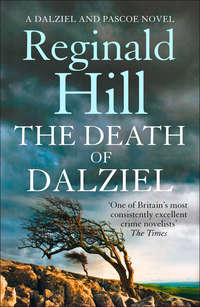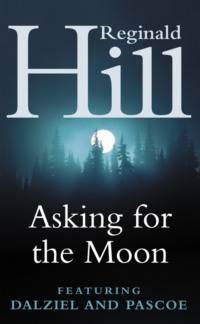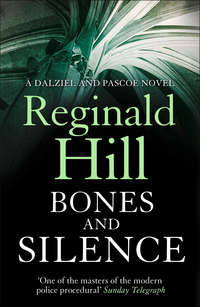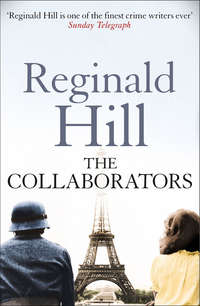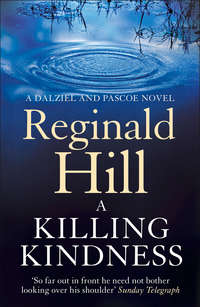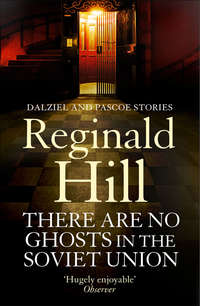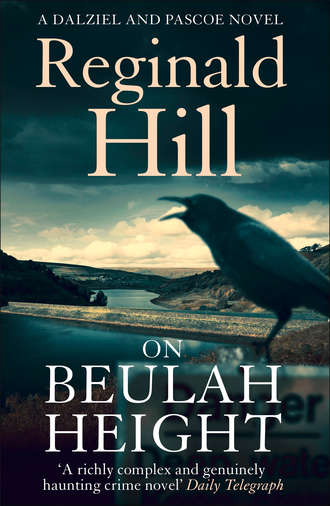
Полная версия
On Beulah Height
‘When?’ said Pascoe. ‘You don’t think that there’s …’
He was interrupted by Sergeant Clark from the doorway.
‘Excuse me, sir, but Mr Douglas the vet’s here. We got him on his mobile coming back from a farm call.’
‘Vet?’ said Dalziel to Pascoe. ‘What’s up? Feeling badly?’
In the kitchen they found a broad-built grey-bearded man kneeling down by the dog basket. His examination of the mongrel produced the odd rumbling growl but nothing as menacing as the snarl provoked by Pascoe’s inexpert probe.
Finally he stood up and turned his attention to the humans.
‘Peter Pascoe, DCI,’ said Pascoe, offering his hand. ‘And this is Superintendent Dalziel.’
‘We’ve met,’ said Douglas shortly. His voice had a Scots burr.
‘Aye, what fettle, Dixie?’ said Dalziel. ‘So, what’s the damage?’
‘Shoulder and ribcage badly bruised. I don’t think there’s a fracture, but he needs an X-ray to be sure. Possibility of internal injury. I think it’s best in all the circumstances if I take him back to the surgery with me. Any news of the wee lassie?’
‘Not yet,’ said Pascoe. ‘These injuries, what do you think caused them?’
‘No accident, that’s for sure,’ said the vet flatly. ‘If I had to guess, I’d say someone had given the poor beast a good kicking. Good day to you.’
Gently he lifted the dog from the basket and went out of the kitchen.
‘Good man, that,’ said Sergeant Clark approvingly. ‘Really worries about sick animals.’
‘Aye, well, he supports Raith Rovers,’ said Dalziel. ‘So someone gave the dog a kicking. That’s enough to get the show on the road. Good thinking to have the beast checked out.’
Pascoe said, ‘Yes. Well done, Sergeant Clark. So what do you want me to do, sir? Call in the troops and set up an incident room?’
‘Aye, best go by the book,’ said Dalziel without enthusiasm. ‘Any suggestions, Sergeant? As far as I recall, your Section Office isn’t big enough to swing a punch in.’
‘St Michael’s Hall, sir,’ said Clark with brisk efficiency. ‘Doubles as assembly hall and gym for the primary school and as a community centre. I’ve spoken on the phone with Mrs Shimmings the school head. You’ll likely remember her, sir. She were in Dendale, like me. Miss Lavery, she was then. She’s really upset. Says she’ll go to the school now to be on hand in case we need her help, talking about the little girl and such.’
Dalziel looked at him reflectively and said, ‘Well done, Sergeant. You’re thinking so far ahead, you’ll end up telling fortunes. OK, Peter, off you go. Tell ’em I want someone from uniformed who knows left from right to head up the search team. Maggie Burroughs’ll do nicely. And we’ll need a canteen van. It’ll be thirsty work tramping round them fells. And an information caravan for the Common. I’ll be here to see they get themselves sorted. Any questions?’
‘No, sir,’ said Pascoe. ‘Lead on, Sergeant.’
Clark went out. As Pascoe followed, Dalziel’s voice brought him to a halt.
‘Word of advice, lad,’ he said.
‘Always welcome,’ said Pascoe.
‘Glad to hear it. So listen in. You do Nobby Clark a favour, don’t let him pay you back in beer. Make sure you work the bugger’s arse off. All right?’
Not just a conjuring trick, thought Pascoe. He really does know everything.
‘Yes, sir,’ he said. ‘Right off its haunches.’
SIX
St Michael’s Primary, like Danby itself, had grown.
The original stone building, apparently modelled on the old church from which it took its name, had sprouted several unbecoming modern extensions which compensated in airiness for what they lacked in beauty. The Hall, standing between the church and the school, was clearly designed by the same hand and even had a belfry and stained-glass windows through which filtered a dim religious light to illumine a spacious lofty interior with a stage at one end and a small gallery at the other.
Pascoe wrinkled his nose as the musty smell set up resonances both of lessons in the gym and of amateur dramatics in draughty village halls. Not that the entertainments on offer here were totally amateur. Among the notice board’s ‘Forthcoming Attractions’ he saw a poster for the opening concert of the eighteenth Mid-Yorkshire Dales Music Festival due to take place the following Wednesday and consisting of a song recital by Elizabeth Wulfstan, mezzo-soprano, and Arne Krog, baritone.
That name again. He recalled the strong young voice singing mournfully, And now the sun will rise as bright/As though no horror had touched the night …
The heat wave looked set for many more days, perhaps weeks, but he doubted if there’d be any more bright dawning for the Dacres.
For Christ’s sake! he admonished himself. Don’t rush to embrace the worst.
‘This will do nicely,’ he said to Clark, and got on his mobile. He’d already set the operation in motion back at Liggside and this was merely to confirm the location. ETA of the first reinforcements was given as thirty minutes.
‘I’ll go and have a word with Mrs Shimmings,’ he said. ‘You OK, Sergeant?’
The man was pale and drawn, as if he’d been exposed to biting winds on a winter’s day.
‘Yes, fine. Sorry. It’s just being here at the school, the incident room … suddenly it’s really happening. I think up till now I’ve been trying to pretend it were different from last time, over in Dendale, I mean. Not that it wasn’t the same then to start with, telling ourselves that at worst there’d been an accident and little Jenny Hardcastle ’ud be found or manage to get back herself …’
‘Then you’ll know how these things work,’ said Pascoe harshly. ‘One thing we’ll need to get sorted quickly is this Benny business. Someone’s responsible for these graffiti. We need to find out who, then we can start asking why. Any ideas?’
‘I’m working on it,’ said Clark. ‘Has to be a stupid joke and a lousy coincidence, hasn’t it, sir? I mean, it were done last night and Lorraine didn’t vanish till this morning. And the perp wouldn’t do it in advance, would he?’
‘Less chance of being caught,’ said Pascoe.
‘But that ’ud mean the whole thing were planned!’
‘And that’s worse than impulse? Well, you’re right. Worse for us, I mean. Impulse leaves traces, plans cover them up. Either way, we need the spray artist.’
‘Yes, sir,’ said Clark. ‘Sir …’
‘Yes?’ prompted Pascoe.
‘Benny. Benny Lightfoot. Anything you know that I don’t? I mean, there could be information that reached HQ but you felt best not to pass on down here, for fear of opening old wounds …’
‘You mean, could Benny really be back?’ said Pascoe grimly. ‘From what I’ve heard, I doubt it. But the very fact that you can ask shows how important it is to finger this joker’s collar. Get to it.’
He walked across the playground to the school. He could see the figure of the head teacher at the window of a classroom he guessed would be Lorraine’s. She’d been standing at the main entrance when they arrived, but after a brief exchange, he’d cut the conversation short and headed into the hall.
Now he joined her in the classroom and said, ‘Sorry about that, Mrs Shimmings, but I had to get things rolling.’
‘That’s OK,’ she said. ‘I know how these things work.’
He recalled then that like Clark, she too had been here before. Looking at her closely, he detected the same symptoms of re-entry to a nightmare she thought she’d left behind.
She was a slimly built woman with greying chestnut hair and candid brown eyes. Late forties. Thirty-plus when Dendale died.
She said, ‘So you think the worst?’
‘We prepare for the worst,’ said Pascoe gently. ‘Tell me about Lorraine.’
‘She was … is a bright, intelligent child, a little what they used to call old-fashioned in some ways. It doesn’t surprise me to hear that she got up early and decided to take her dog for a walk all by herself. It’s not that she’s a solitary child. On the contrary, she’s extremely sociable and has many friends. But she never has any difficulty performing tasks by herself and on occasion, if given a choice, she will opt for the solitary rather than the communal activity.’
After the initial slip, she had kept determinedly, almost pedantically to the present tense. As she talked, Pascoe let his gaze wander round the classroom. Bringing up Rosie had honed his professional eye to the school environment. Now he found himself assessing the quality of wall displays, the evidence of thought and order, the use of material that was stimulating aesthetically, intellectually, mathematically. In this classroom everything looked good. This teacher hadn’t shot away on Friday afternoon but had stayed behind after the children had gone, to refine their efforts at tidying up and make sure the room was perfectly prepared for Monday morning. This teacher, he guessed, was going to be devastated when she discovered what had happened to one of her pupils.
He said, ‘Would she go off with a stranger?’
‘Someone offering her sweets in the street, asking her to get into a car, no way,’ said Mrs Shimmings. ‘But you say she’d gone up the dale for a walk? Things are different up there, Mr Pascoe. Do you do any walking yourself?’
‘A little,’ said Pascoe, thinking of Ellie cajoling her rebellious husband and daughter into completing the Three Peaks Walk last spring.
‘Then you’ll know that, in the street if a complete stranger says “Hello” to you, you think there’s something wrong with him, but up there on the hills if you meet anyone, you automatically exchange greetings, sometimes even stop and have a chat. Not to say something would be the odd thing. Yes, I think that nowadays we’ve all got our children trained to regard strangers with the utmost suspicion, but they learn by example more than precept, and out in the country the example they get is of strangers being greeted almost like old acquaintance.’
‘So she might stop and talk.’
‘She wouldn’t be surprised if someone spoke to her and she wouldn’t run. Indeed, up there, what would be the point? Didn’t she have her dog with her, though?’
‘Dogs are an over-rated form of protection,’ said Pascoe. ‘Unless they’re so big and fierce, you wouldn’t let a little girl take it out alone anyway. This one may have tried. It got badly kicked about for its pains. Any of these Lorraine’s?’
He was looking at a display of paintings with the general heading ‘My Family’.
Even as he asked, he saw the neatly printed label LORRAINE’S FAMILY under a picture of a man and a woman and a dog. The human figures were of roughly equal size, both with broad slice-of-melon smiles. The dog was, relatively, the size of a Shetland pony. Psychologists would probably say this meant she had no hang-ups with either parent, but was really crazy about Tig. Just what you’d hope to find in a seven-year-old girl. He recalled his own sinking feeling a little while back when, without comment, Ellie had shown him a painting of Rosie’s which had her standing there like the fifty-foot woman and himself a mere black blob in a car moving away fast.
‘Happy family?’ he said.
‘Very happy. I’ve known the mother since she was a girl.’
‘Of course. You used to teach in Dendale back before they built the reservoir, I gather.’
‘That’s right. Like everyone else, I had to move out. Part of the price of progress.’
‘But in the end, some people were probably glad to go, even to see the valley under water?’ he probed.
‘You think Lorraine’s disappearance may have something to do with what happened back then?’
‘You tell me, Mrs Shimmings,’ said Pascoe. ‘I wasn’t around then. You’ve heard about these painted signs? “Benny’s Back”?’
She nodded.
‘So, could he be back? And if so, where’s he been? I heard he was a bit simple.’
‘He could have been living with people who don’t ask questions or make judgements,’ she offered. ‘Like these New Age travellers. Anyway, Benny wasn’t simple. In fact, he was very bright.’
‘I’m sorry. I was told he’d had an accident … something about a plate in his head …’
‘Oh, that,’ she said dismissively. ‘I taught Benny both before and after that accident, Mr Pascoe. And he was just as sharp after it as before. But he was always different, and folk in Yorkshire confuse different with daft just as readily as anywhere else. No, he wasn’t simple, but he was … fey, I think that’s the word. I taught him till he was old enough to go to the secondary. That meant taking the bus out of the dale and he wasn’t keen. But his father told him to go and do his best, and Benny paid a lot of heed to Saul, his dad. Then, when Benny was twelve, Saul Lightfoot died.’
‘How?’ asked Pascoe. The policeman’s question.
‘He drowned. He was a fine athletic man,’ said Mrs Shimmings, with what a romantic observer might have called a faraway look in her eyes. ‘He used to go swimming in the mere. He was a good strong swimmer, but they think he got tangled up with a submerged tree branch. It devastated poor Benny. The family all lived with old Mrs Lightfoot, Benny’s gran, in Neb Cottage. It must have been a tight squeeze, there were three kids: Benny, and his younger brother and sister, Barnabas and Deborah. But it worked all right as long as Saul was around. He was that sort of man. Charismatic, I suppose they’d say nowadays. Or what the young girls would call a hunk.’
Pascoe smiled and glanced surreptitiously at his watch. Local history was fine, but he had responsibilities in the here and now which wouldn’t wait.
‘I’m sorry, I’m holding you back,’ said Mrs Shimmings.
He’d forgotten she was a head teacher with an eye long trained for the tell-tale minutiae of behaviour.
‘Nothing I can do till my men arrive,’ he assured her. ‘Please, carry on.’
‘Well, Marion, that’s Benny’s mother, and old Mrs Lightfoot never really got on. She wasn’t a country lass, Saul had met her at a dance in town, and now with him gone, there was nothing to keep her in Dendale. It was no surprise when she got a job in town and took the children off. Benny came back from time to time to see his gran. I gathered he wasn’t happy. Not that he spoke much to anyone, he was becoming more and more withdrawn. Then it seems his mother met up with a new man. He moved in. I think that ultimately they got married, but only because they’d decided to emigrate – Australia, I think it was – and being married made things easier. Benny didn’t want to go. The night before they were due to leave, he took off and came to his gran’s. Marion came looking for him. He refused point-blank to go back with her and old Mrs Lightfoot said he could stay with her. So that’s what happened. I daresay there were a great number of other things said that shouldn’t have been said. Net result was the family left and Benny settled in at Neb Cottage. As far as I can make out, he dropped right out of school. The truancy officer came round several times, and the Social Services, but at the first sight of anyone vaguely official, indeed anyone he didn’t recognize, Benny would take off up the Neb, and in the end they more or less gave up, though I’m sure they found some face-saving formula to regularize the situation.’
‘How do you regularize truancy?’ wondered Pascoe.
‘You don’t. Time does that,’ said Mrs Shimmings. ‘I think they must have heaved a mighty sigh of relief in the Education Office when Benny passed his sixteenth birthday. But the psychological damage was done. Benny was wary, elusive, introverted, solitary, devoid of social skills – in other words, in the eyes of most people, plain simple.’
‘And could he have been responsible for the disappearances?’ he asked.
‘Sex is a strong mover in young men,’ she said. ‘But before the attack on Betsy Allgood, I had serious reservations. After that, however …’
She shook her head. ‘You were quite right what you said before. In the end, I think a lot of folk were glad to get out of Dendale, glad to see it go under water. The more biblically inclined saw it as a repeat of the Genesis flood, aimed at drowning out wickedness.’
‘Nice thought,’ said Pascoe. ‘But wickedness is a strong swimmer. And how did you feel, Mrs Shimmings?’
It seemed an innocent enough question, but to his distress he saw her eyes fill with tears, even though she turned away quickly to hide them and went to the teacher’s desk.
‘Funny,’ she said. ‘While I was waiting for you, I went into our little library and this was the book I picked out.’
She took a book from the desktop and held it up so he could see the title.
It was The Drowning of Dendale.
‘I know it,’ said Pascoe. ‘My wife has a copy.’
It was, as he recalled, a coffee-table book, square-shaped and consisting mainly of photos with very little text. It was in two parts, the first entitled ‘The Dale’, the second ‘The Drowning’. The first photograph was a panorama of the whole dale, bathed in evening light. And the epigraph under the subtitle was A happy rural seat of various view.
‘Paradise Lost,’ said Mrs Shimmings. ‘That’s how I felt, Mr Pascoe. It may have been spoilt, but it was still like leaving Paradise.’
A horn blew outside. Glad of a diversion from this highly charged and, he hoped, totally irrelevant display of emotion, Pascoe went to the window.
They were arriving, all kinds of vehicles bearing everything necessary for the Centre. Furniture, telephones, radios, computers, catering equipment, and of course personnel. Must be like this in a war, he thought. Before a Big Push. Like Passchendaele. So much hustle and bustle, so many men and machines, failure must have seemed inconceivable. But they had failed, many many thousands of them needlessly killed, one of them his namesake, his great-grandfather, not drowning in mud or shattered by shell-fire, but tied to a post and shot by British bullets …
He said, ‘We’ll talk again later, Mrs Shimmings,’ and went out to take control.
SEVEN
‘I often think they’ve only gone out walking,
And soon they’ll come homewards all laughing and talking.
The weather’s bright! Don’t look so pale.
They’ve only gone for a hike updale.’
‘So what’s this? Narcissism, or the artist’s response to just criticism?’
Elizabeth Wulfstan pressed the pause button on her zapper and turned her head to look at the man who’d just come in.
The years had been good to Arne Krog. Into his forties now, his unlined open face framed in a shock of golden hair and a fringe of matching beard kept him looking more like Hollywood’s idea of a sexy young ski-instructor than anyone’s idea of a middle-aged baritone. And if, in terms of reputation and reward, the years had not been quite so generous, he made sure it didn’t show.
She said, ‘Most of what you said was right. Makes you happy, does it?’
She spoke with a strong Yorkshire inflexion which came as a surprise to those who knew her by her singing voice alone.
‘It makes me happy that you have seen your error. Never mind. It will be a collector’s disc when you are old and famous. Perhaps then, to be contrary, you will make your last recording of songs best suited to a young, fresh voice. But preferably in the language in which they were written.’
‘I wanted folk to understand them,’ she said.
‘Then give them a translation to read, not yourself one to sing. Language is important. I should have thought someone so devoted to her own native woodnotes wild would have understood that.’
‘Don’t see why I should have to speak like you just to please some posh wankers,’ she said.
She smiled briefly as she spoke. Her face with its regular features, dark unblinking eyes, and heavy patina of pale make-up, all framed in shoulder-length ash blonde hair, had a slightly menacing mask-like quality till she smiled, when it lit to a remote beauty, like an Arctic landscape touched by a fitful sun. She was five nine or ten, and looked even taller in the black top and lycra slacks which clung to her slim figure.
Krog’s eyes took this in appreciatively, but his mind was still on the music.
‘So you will change your programme for the opening concert?’ he said. ‘Good. Inger will be pleased too. The transcription for piano has never been one she liked.’
‘She talks to you, does she?’ said Elizabeth. ‘That must be nice. But chuffed as I’d be to please our Inger, it’s too late to change.’
‘Three days,’ he said impatiently. ‘You have the repertoire and I will help all I can.’
‘Thanks,’ she said sincerely. ‘And I’d really like your help to get them right. But as for changing, I mean it’s too late in here.’
She touched her breastbone.
He looked exasperated and said, ‘Why are you so obsessed with singing these songs?’
‘Why’re you so bothered that I’m singing them?’
He said, ‘I do not feel that, in the circumstances, they are appropriate.’
‘Circumstances?’ She looked around in mock bewilderment. They were in the elegant high-ceilinged lounge of the Wulfstans’ town house. French windows opened on to a long sunlit garden. Faintly audible were the rumbles of organ music under the soaring line of young voices in choir. If they’d stepped outside they could have seen a very little distance to the east the massive towers of the cathedral whose gargoyled rain-spouts seemed to be growing ever longer tongues in this unending drought.
‘Didn’t think you got circumstances in places like this,’ said Elizabeth.
‘You know what I mean. Walter and Chloe …’
‘If Walter wanted to complain, he’s had the chance and he’s got the voice,’ she interrupted.
‘And Chloe?’
‘Oh aye. Chloe. You still fucking her?’
For a moment shock time-warped him to his early forties.
‘What the hell are you talking about?’ he demanded, keeping his voice low.
‘Come on, Arne. That’s one English word no one needs translating. Been going on a long time, hasn’t it? Or should I say, off and on? All that travelling around you do. Must be great comfort to her you don’t let yourself get out of practice, but. Like singing. You need to keep at your scales.’
He had recovered now and said with a reasonable effort at lightness, ‘You shouldn’t believe all the chorus-line gossip you hear, my dear.’
‘Chorus line? Oh aye, I could give Chloe enough names to sing the Messiah.’
He said softly, ‘What’s the point of this, Elizabeth? What do you want?’
‘Want? Can’t think of owt I want. But what I don’t want is Walter getting hurt. Or Chloe.’
‘That is very … filial of you. But you work very hard at that role, don’t you? The loving, and beloved, daughter. Though in the end, alas, as with all our roles, the paint and wigs must come off, and we have to face ourselves again.’
He spoke with venom, but she only grinned and said, ‘You sound like you got out the wrong side of bed. And you were up bloody early too. Man of your age needs his sleep, Arne.’
‘How do you know how early I got up? Am I under twenty-four hour surveillance then?’
‘Woke with the light myself, being a country lass,’ she said. ‘Heard your car.’
‘It could have been someone else’s.’
‘No. You’re the only bugger who changes up three times between here and end of the street.’
He shrugged and said, ‘I was restless, the light woke me also. I wanted to go for a walk, but not where I’d be surrounded by houses.’
‘Oh aye? See anyone you know?’
He fingered the soft hair of his beard into a point beneath the chin and said, ‘So early in the day I hardly saw anyone.’
She said, ‘Give us a knock next time, mebbe I’ll come with you. Listen, now you’re here, couple of things in the Mahler you can help me with.’
He shook his head wonderingly and said, ‘You are incredible. I tell you, I think you made a mistake to sing these songs on your first recording and that you will be making another to sing them at the concert. You ignore my advice. You make outrageous accusations, and now you want me to help you to do what I do not think you should be doing anyway!’


